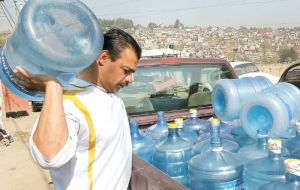MercoPress. South Atlantic News Agency
Caracas short or power and water for next six months
 Short showers and torches at home, Chavez advices to save water and power
Short showers and torches at home, Chavez advices to save water and power Venezuelan president Hugo Chavez warned he will go after all those industries and factories private or government managed, that waste power and/or water.
Years of mismanagement, lack of investments, a prolonged drought and booming demand with frozen utility rates have been the ingredients for this cocktail that could have serious consequences for the Bolivarian revolution project and XXI Socialism.
Chavez said sanctions could go as far as cutting off power completely, and recommended the use of torches at home at night instead of electricity.
“If you get up at three in the morning to the toilet, use a torch instead of turning the light on; that’s enough light, you don’t need more. Just leave the torch by the bed, it’s that simple”, said Chavez during the live deliberations of an emergency cabinet meeting.
Nevertheless Venezuelan officials admitted that the nationalized power plants (2007) need a strong injection of capital to modernize and expand.
Venezuelan opposition has criticized the government for the situation arguing that virtually no investments have been made in the power sector since Chavez took office with his dreams of a Bolivarian revolution.
Chavez also anticipated he would be making random and surprise visits to factories to personally check they are not squandering power or water, and promised fines and closures to all those trespassing.
He also called on the big shopping malls to save power and invited them to generate their own electricity.
Chavez ordered Vice-president Ramon Carrizalez that “if caught once, you cut power for one day; when caught twice, the cut is for a month and on the third time, complete blackout until new orders”.
The compulsory power savings follow the announcement of water rationing in the capital Caracas 48 hours a week. The measure is the start of a possible six months of rationing before the rainy season in Venezuela begins again.
Although people were warned of the problem ahead of time Caracas residents woke up this week to dry taps, first day of a possible six months of the measures.
More than 20 main districts of Caracas were affected with a further 24 due to have their water cut off later on the week.
But some of the poorer parts of the city are already dependent on emergency supplies of clean drinking water, delivered every 11 days by tanker.
Mr Chavez has blamed the problem on a particularly dry rainy season, saying the climatic effect of El Niño is to blame for the city's empty reservoirs.
The Bolivarian revolution leader recently urged Venezuelans to take no more than three minutes in the shower to save on water and electricity.
Venezuela's National Institute of Meteorology and Hydrology also pointed a finger at something called quasi-biennial oscillation, which affects winds in the stratosphere.
“This other phenomenon,” the institute said in a statement, ”has a relationship with the rains, and is capable of modifying or changing the magnitude and impacts of the effects that El Niño has brought”.




Top Comments
Disclaimer & comment rulesCommenting for this story is now closed.
If you have a Facebook account, become a fan and comment on our Facebook Page!